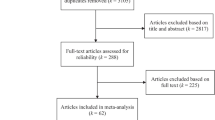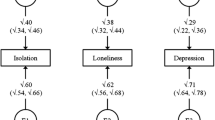Summary
Life events and supportive social networks are often treated as separate independent variables in their relations with supposed dependent variables such as depressive disorder. It is important therefore to establish that they are independent of one another. One hundred and twenty one men and women attending psychiatric hospitals with depressive disorders were interviewed at the time of their initial contact by a research psychiatrist and a week later by a non-clinical research worker who enquired about life events (LEDS) and about social networks (IMSR). One hundred and eleven patients were successfully followed up in the same manner, typically 4 months later. Social networks were very stable over time. Where they did change, this could not be explained in terms of losses of social contact due to events such as death of a primary group member. The rating of threatening events and difficulties was also unrelated to the quality of social support networks. Institutional rearing in childhood was associated with substantially smaller adult primary networks. It was concluded that over short periods of time, measures based on the LEDS and IMSR are independent, but that major social disruptions may have life long effects on social support networks.
Similar content being viewed by others
References
Alloway R, Bebbington P (1987) The buffer theory of social support — a review of the literature. Psychol Med 17: 91–108
Bebbington PE, Brugha T, Maccarthy B, Potter J, Sturt E, Wykes T, Katz R (1988) The Camberwell collaborative depression study. I. The investigation of depressed probands. Br J Psychiatry 152: 754–765
Brewin CR, MacCarthy B, Furnham A (1989) Social support in the face of adversity: the role of cognitive appraisal. J Res Pers 23: 354–372
Brown GW, Harris TO (1978) Social origins of depression. Tavistock, London
Brown G, Rutter M (1966) The measurement of family activities and relationships. Hum Relat 19: 241–263
Brugha TS, Conroy R, Walsh N, Delaney W, O'Hanlon J, Dondero E, Daly L, Hickey N, Bourke G (1982) Social networks, attachments and support in minor affective disorders: a replication. Br J Psychiatry 141: 249–255
Brugha TS, Bebbington PE, MacCarthy B, Potter J, Sturt E, Wykes T (1987a) Social networks social support and the type of depressive illness. Acta Psychiatr Scand 76: 664–673
Brugha TS, Sturt E, MacCarthy B, Potter J, Wykes T, Bebbington PE (1987b) The Interview Measure of Social Relationships: the description and evaluation of a survey instrument for assessing personal social resources. Soc Psychiatry 22: 123–128
Burgess WJ (1984) Do humans show a “Species Typical” group size? Age, sex and environmental differences in the size and composition of naturally-occurring casual groups. Ethol Sociobiol 85: 951–57
Champion LA (1990) The relationship between social vulnerability and the occurrence of severely threatening life events. Psychol Med 20: 157–162
Cutrona CE (1989) Ratings of social support by adolescents and adult informants: degree of correspondence and prediction of depressive symptoms. J Pers Soc Psychol 57: 723–730
Hammer M (1980) Social access and the clustering of personal connections. Soc Networks 2: 305–325
henderson S, Byrne DG, Duncan-Jones P (1981) Neurosis Soc Environment Academic, Sydney
Jenkins R, Mann AH, Belsey E (1981) The background design and use of a short interview to assess social stress and support in research and clinical settings. Soc Sci Med 15E: 195–203
Kraemer GW (1985) Effects of differences in early social experience on primate neurobiological-behavioural development. In: Reite M, Field T (eds) The psychobiology of attachment and separation. Academic, London, pp 135–162
Mitchell RE, Moos RH (1984) Deficiencies in social support among depressed patients: antecedents or consequences of stress? J Health Soc Behav 25: 438–452
Monroe SM, Steiner SC (1986) Social support and psychopathology: interrelations with pre existing disorder, stress and personality. J Abnorm Psychol 95: 29–39
Repetti RL (1987) Individual and common components of the social environment at work and psychological wellbeing. J Pers Soc Psychol 52: 710–720
Rutter M, Quinton D (1984) Long-term follow-up of women institutionalised in childhood: factors promoting good functioning in adult life. Br J Dev Psychol 2: 191–204
Steinglass P, Weisstub E, Denoar AK (1988) Perceived personal networks as mediators of stress reactions. Am J Psychiatry 145: 1259–1264
Surtees PG (1989) Hosts to adversity. I. An epidemiological perspective. Acta Psychiatr Scand 80: 194–295
Tennant C (1988) Parental loss in childhood. Its effects in adult life. Arch Gen Psychiatry 45: 1045–1050
Wing JK, Sturt P (1978) The PSE-ID-CATEGO system: supplementary manual. Institute of Psychiatry, London (Mimeo)
Wing JK, Cooper JE, Sartorius N (1974) Measurement and classification of psychiatric symptoms. University Press, Cambridge
Wolkind S, Rutter M (1985) Separation, loss and family relation ships. In: Rutter M, Hersov L (eds) Child and adolescent psychiatry, Chapter 3. Blackwell Scientific, London
Author information
Authors and Affiliations
Rights and permissions
About this article
Cite this article
Brugha, T.S., Bebbington, P.E., Sturt, E. et al. The relation between life events and social support networks in a clinically depressed cohort. Soc Psychiatry Psychiatr Epidemiol 25, 308–313 (1990). https://doi.org/10.1007/BF00782886
Accepted:
Issue Date:
DOI: https://doi.org/10.1007/BF00782886




